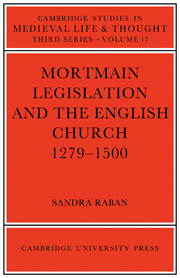Book contents
- Frontmatter
- Contents
- List of graphs and tables
- Preface
- List of abbreviations
- INTRODUCTION
- 1 THE STATUTE OF 1279 AND ITS ANTECEDENTS
- 2 THE WORKING OF THE STATUTE
- 3 ENFORCEMENT OF THE STATUTE
- 4 MANIPULATION OF THE STATUTE
- 5 PATTERNS OF ECCLESIASTICAL ACCESSION
- 6 THE IMPACT OF MORTMAIN LEGISLATION ON THE CHURCH
- CONCLUSION
- Appendix: The Statute of Mortmain 1279
- Bibliography
- Index
2 - THE WORKING OF THE STATUTE
Published online by Cambridge University Press: 05 March 2012
- Frontmatter
- Contents
- List of graphs and tables
- Preface
- List of abbreviations
- INTRODUCTION
- 1 THE STATUTE OF 1279 AND ITS ANTECEDENTS
- 2 THE WORKING OF THE STATUTE
- 3 ENFORCEMENT OF THE STATUTE
- 4 MANIPULATION OF THE STATUTE
- 5 PATTERNS OF ECCLESIASTICAL ACCESSION
- 6 THE IMPACT OF MORTMAIN LEGISLATION ON THE CHURCH
- CONCLUSION
- Appendix: The Statute of Mortmain 1279
- Bibliography
- Index
Summary
On 14 November 1279 the justices of the bench and probably all shire officials were ordered to see that the Statute of Mortmain was read out and observed in England and Wales, although the position in Ireland was more ambiguous. Thereafter, churchmen were theoretically powerless to extend their possessions, but in practice the situation was not so clear-cut. In the first place, it was by no means certain that the crown would not relent and repeal or amend the law, or at least allow certain exemptions. The church lobbied hard with this in view. Between April and July 1280, Hugh de Brisingham, a friar at Salisbury, tried to mobilise Robert Burnell, the royal chancellor, in the interest of the Franciscans. He wrote, unsuccessfully, asking Burnell to obtain a letter which would exempt the friars of the whole province from the statute. In the November parliament of 1280, six proposals to modify the statute were put forward by the church as part of a series of gravamina. The most important of these articuli cleri asked that bishops, the secular clergy and mendicant orders should be exempt from the statute. There was some hope also that inadequately endowed religious houses might be made an exception to the ban on acquisition. In addition, a more favourable version of two phrases in the statute, ‘any lands’ and gains made ‘in any way’, was sought.
- Type
- Chapter
- Information
- Mortmain Legislation and the English Church 1279–1500 , pp. 29 - 71Publisher: Cambridge University PressPrint publication year: 1982

